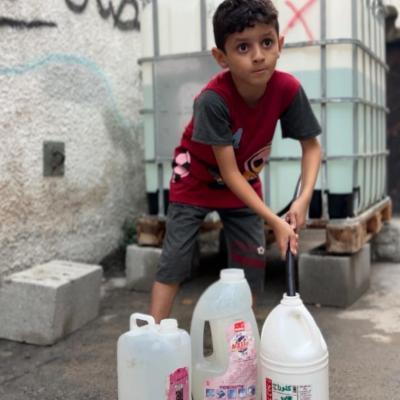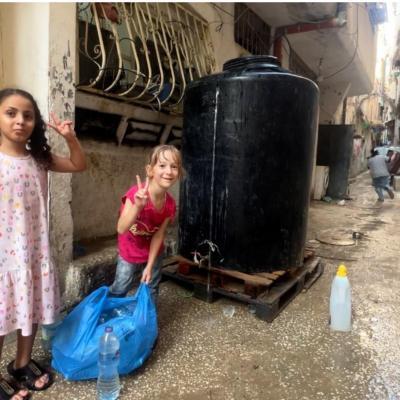(MENAFN- Palestine News Network )
TULKARM /PNN /
Residents of Tulkarm refugee camp are living under harsh conditions imposed by Israeli policies of repression and displacement, which not only target the land but also every aspect of life, from the air Palestinians breathe to the water they drink. The occupation, through systematic tactics, aims to drain the spirit of the people before it dries out the land, using water as a weapon in its ongoing war.
A report prepared by Alrowwad Cultural And Arts Society as part of the "Investing in Human Rights" project, In partnership with ASTM and produced by Palestine News Network (PNN), highlighted that targeting water networks is not just a hostile act but a displacement tactic designed to drain hope from the hearts of the people. When the water runs dry, life withers, turning survival into a daily struggle.
Every moment in the camp becomes a battle to secure a drop of water, searching for a well that hasn't been reached by the occupation. Men, women, and children suffer to obtain water to quench their thirst and maintain their resilience.
Khaled Abu Issa, an activist from the Return Centre in Tulkarm Camp, said that the scale of destruction in the camp is immense and indescribable, with infrastructure, including sewage, water, and electricity networks, destroyed, in addition to the demolition of homes.
He added that the Return Centre has provided water tanks for most of the camp's neighbourhoods, filling these tanks with water through deliveries, with the help of local organisations and generous individuals. However, residents face great difficulties in refilling these tanks, often having to walk long distances as water trucks cannot reach many of the camp's dug-up streets.
Abu Issa emphasised the importance of water in life, explaining that the centre is doing everything possible to alleviate the burden on residents so they can meet their needs.

He expressed his joy whenever they can provide water to camp residents, describing it as a significant achievement given the circumstances, driven by the essential nature of water itself.
Abu Issa, explained that the Israeli occupation is pursuing a deliberate policy of displacement and destruction aimed at exhausting the Palestinian residents, forcing them to abandon the camp. This is part of a broader strategy to erase refugee camps and the right of return, a core issue in the Palestinian struggle. However, despite the hardships and suffering, the camp's residents remain steadfast.
He emphasised that these policies are not just about damaging infrastructure but are designed to instill despair and push people to leave their homes and land. The camp's residents know that water is the lifeblood of survival, and whoever controls the water controls the future. Therefore, each battle for a drop of water becomes a fight for freedom, survival, and an inalienable right that cannot be negotiated or compromised.
Intisar Nafeh, a resident of Tulkarm camp, stated that they have been affected by the water shortage for over 35 days since the start of the Israeli incursion. The complete destruction of the water networks and streets has prevented water trucks from reaching them, a tactic she believes is aimed at weakening their resolve and forcing them to leave the camp. Nevertheless, she affirmed their determination to stay in their homes no matter what.
She added that residents are now forced to buy bottled water to meet their basic needs, placing a significant financial burden on them.
Another camp resident remarked that the occupation systematically destroys water networks whenever they enter the camp. She noted that two water networks had previously survived past incursions, but the occupation deliberately destroyed them during the latest invasion.

She continued by explaining that the destruction doesn't stop with the water networks; the occupation also targets water tanks, which people rely on while waiting for the municipality to repair the damaged infrastructure.
Tulkarm camp, she said, is a disaster zone where movement is difficult, and the living conditions are catastrophic. Even basic services like medical facilities have been targeted by the occupation, and the severe road conditions make it impossible for everyone to access the few remaining clinics. The occupation has also placed dirt barriers between neighbourhoods and streets, further worsening mobility.
Despite these challenges, the question remains: how long will this daily struggle continue? How long will the world remain silent in the face of the occupation's displacement policies that target the very basics of life? In these dire conditions, the camp's residents prove that resilience is not just a word but a daily action, a reality they face every day against policies that know only oppression and injustice.
MENAFN16092024000205011050ID1108679306
Legal Disclaimer:
MENAFN provides the information “as is” without warranty of any kind. We do not accept any responsibility or liability for the accuracy, content, images, videos, licenses, completeness, legality, or reliability of the information contained in this article. If you have any complaints or copyright issues related to this article, kindly contact the provider above.